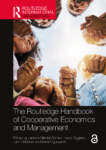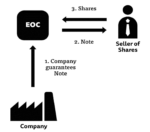When is a “Coop” not really a cooperative? The short answer is whenever the actual activity of the “cooperative” is not carried out by the members but by employees. The problem is, of course, not in cooperation per se but in the hiring, employing, renting, or leasing of people to carry out the supposedly “cooperative” activities of the “cooperative.”
Historical and Modern Arguments about Contractual Slavery
The overall conclusion is that any institution or practice—human trafficking is a modern case in point—that, in effect, treats a person as a non-person, as only a means instead of as an end-in-themselves, violates their inalienable rights and is illegitimate, even with consent.
Is “Capitalism” a Misnomer? On Marx’s “capitalism” and Knight’s “civilization”
This is an open access article from the European Journal of the History of Economic Thought.
The name “capitalism” derives from Marx’s false analogy between medieval land ownership and the “ownership of the means of production.” However, unlike medieval land, capital goods can be rented out, e.g., by Frank Knight’s entrepreneur, and then the capital owner does not hold those management or product rights. What then is the characteristic institution in our civilization? It is the voluntary renting of workers. What then is the relationship between Classical Liberalism, the dominant philosophy behind Economics, and a lifetime labor contract? Frank Knight had plenty to say against the doctrine of inalienable rights which disallows such contracts.
The Kantian Person/Thing Principle in Political Economy
This is Chapter 4 in my book: Ellerman, David. 1995. Intellectual Trespassing as a Way of Life: Essays in Philosophy, Economics, and Mathematics. Lanham MD: Rowman & Littlefield.
Ethical theories can be broadly grouped into utilitarian theories and rights-based theories. Modern economics is so thoroughly utilitarian that most economists would be hard-pressed to cite the application of a rights-based argument to economic institutions. Yet the normative principles outlined in the first two chapters, the labor theory of property and the de facto theory of inalienability, are squarely within the rights-based tradition. The democratic principle of self-determination is also a closely allied rights-based theory [see Ellerman 1992].
The Libertarian Case for Slavery (A Spoof on Nozick)
This is Chapter 3 from my book: Ellerman, David. 1995. Intellectual Trespassing as a Way of Life: Essays in Philosophy, Economics, and Mathematics. Lanham MD: Rowman & Littlefield.
Liberalism is living a lie. It pretends that the contract to sell all of one’s labor, the self-enslavement contract, is an invalid contract beyond the pale while the contract to sell one’s labor piecemeal (by the hour, day, month, or year) is a perfectly valid contract above reproach. The self-enslavement contract is one of the skeletons in liberalism’s intellectual closet. Defenders of liberal capitalism are quick to accept even the most superficial arguments against voluntary slavery just to shove the issue back in the closet—just so long as the arguments do not carry over to the current contract to rent oneself out, the employer-employee contract. Who wants to be seen as, in effect, defending voluntary slavery by showing how most arguments against the self-sale contract are baseless (aside from one “J. Philmore”)?
Myth and Metaphor in Orthodox Economics
This is Chapter 2 from: Ellerman, David. 1995. Intellectual Trespassing as a Way of Life: Essays in Philosophy, Economics, and Mathematics. Lanham MD: Rowman & Littlefield.
Discussion of the fundamental questions of political economy is today almost completely clouded and distorted by a number of basic myths and metaphors. Deconstruction is necessary before constructive discussions can begin. The myths and metaphors are concerned with basic conceptions about property and contract, not with prices and markets. As layer upon layer of distortions are removed, new facts and new perspectives on old facts will emerge. These facts have fairly direct normative implications, but the disagreements and controversies are about the facts, not about norms or prescriptions.
Trespassing against the Happy Consciousness of Orthodox Economics
This is Chapter 1 in my book: Ellerman, David. 1995. Intellectual Trespassing as a Way of Life: Essays in Philosophy, Economics, and Mathematics. Lanham MD: Rowman & Littlefield.
This first chapter addresses the problems of trespassing involved in understanding the arguments presented in the first five “controversial” chapters of the collection. These chapters challenge the whole idea of the employer-employee relationship that is the institutional basis for our present version of a private-property market economy. The problems of trespassing against fundamental orthodoxy in the social and moral sciences are of a completely different order of magnitude than the problems of trespassing in the natural and mathematical sciences.
European ESOP
The American Employee Stock Ownership Plan or ESOP is a leveraged buyout mechanism so that the employees in a company can, in effect, do a leveraged buyout of part or eventually all of their own company. ESOP is one of the most successful and unifying models for employee ownership in the world. The purpose of this paper is to analyze the main features of the US ESOP model and to define a technical description of the European ESOP, which builds on the good features of the US model and improves the flawed features.





